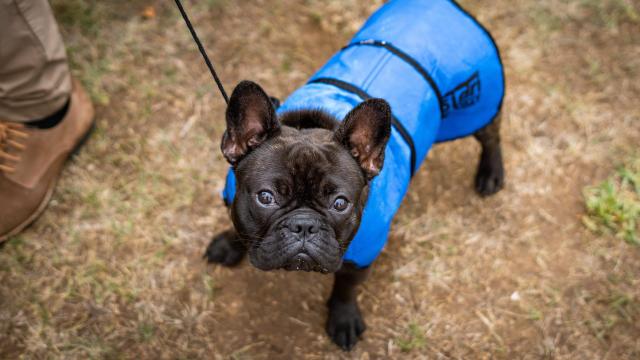Veterinarians in the UK aren’t too pleased with the breeders behind the country’s first known litter of hairless French bulldogs. They argue that it’s only the latest example of how “extreme breeding” is harming the long-term health of these short-faced dogs, who already face a higher risk of certain medical problems. They also fear that the puppies will grow up to develop added complications, like easily sunburned skin.
The trend of hairless Frenchies appears to have begun in 2020, possibly in China. On Facebook, there are numerous pictures and videos of puppies labelled as “Chinese Dushi hairless French bull dogs.” In November 2020, a member of the Facebook group Major League Frenchies announced that they had bought the first young “hairless hypoallergenic” French bulldog, named Bonsai, over to the U.S. And on Wednesday, the Guardian reported that one such litter is now believed to have been bred in Scotland — a feat that’s being roundly condemned by the British Veterinary Association.

“Just because people like things to look a certain way it shouldn’t justify people being able to do things to these dogs that we know is going to cause potential harm and suffering and welfare issues,” Justine Shotton, president of the British Veterinary Association, told the Guardian.
The BVA has been outspoken about the health of bulldogs, pugs, and other short-faced, or brachycephalic, dogs for several years now. Shortened muzzles raise the risk of breathing problems and other conditions, while some breeds are also prone to spinal and neurological issues. Just this week, a new study found that brachycephalic breeds were seven times more likely to develop “cherry eyes,” a rare condition that leaves dogs with a protruding red mass in the corner of their eyes that can increase the odds of eye infections and other problems; for some dogs, this risk was 34 times higher.
These newer dogs are likely to have added challenges due to their hairless skin, Shotton noted. They’ll be more vulnerable to sunburns, less able to regulate their body temperature, and more prone to acne breakouts and skin infections without proper care.
Much of the blame for the health problems found in dogs like the French bulldog can be traced back to a long history of selective breeding, to the point where many pure breeds today are highly inbred. Some countries, including the Netherlands, have now begun to enforce stricter regulations on the breeding of brachycephalic dogs. And some breeders have even started cross-breeding pugs with other dogs in an attempt to restore the healthier body and skull shapes they used to have centuries ago. But cross-breeding in of itself isn’t guaranteed to result in healthier dogs, Shotton warns, especially if it’s only being done to produce novelty designer breeds like these hairless Frenchies. In this case, the dogs are reportedly a mix of French bulldogs, pugs, and Chinese crested dogs.
“I’m just really disappointed when I see things like this and I wish that we can get potential owners to understand how much some of this extreme breeding really does affect the day to day welfare of these dogs,” Shotton told the Guardian.
